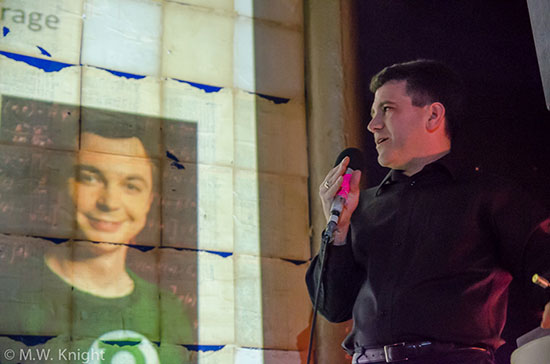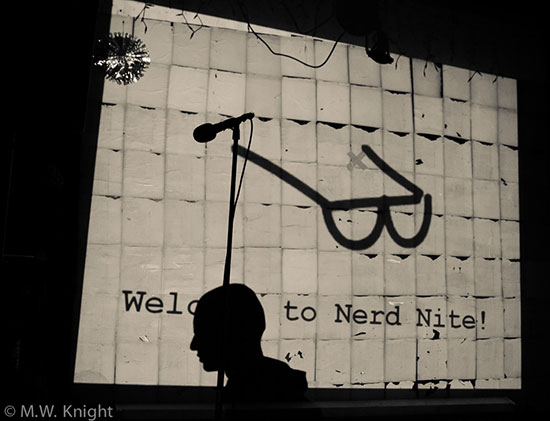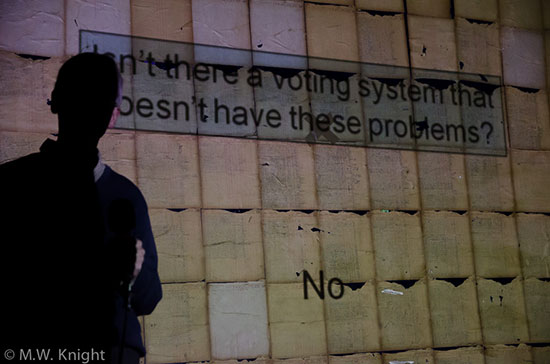The Etymology of "Nerd"
by Andrew Boyd
Today, bazinga! The University of Houston's College of Engineering presents this series about the machines that make our civilization run, and the people whose ingenuity created them.

I had the good fortune of presenting at the inaugural gathering of the Houston chapter of Nerd Nite. Nerd Nite's a growing international movement that celebrates learning in a casual setting. One of organization's slogans pretty well captured the spirit of the evening: "It's like the Discovery Channel — with beer."

The word 'nerd' isn't used as commonly as it once was but most people still know the meaning: someone who's socially awkward, sometimes annoying, frequently tech savvy. Today we might point to the cast of TV's Big Bang Theory, though the high point for the term 'nerd' likely coincided with the 1984 release of the film Revenge of the Nerds. In a now famous scene, audience members flock to the stage of a homecoming event and express their pride in being nerds. When Revenge of the Nerds moved out of theatres and onto college campuses, the scene routinely brought movie-going engineers out of their seats, declaring their own nerdish pride as they rushed the projection screen.
So where did the word "nerd" come from? In 1987 columnist John Dvorak of PC Magazine posed the question to his readers. The responses were many.
Some believed it was a contraction of ne'er-do-well. Others hypothesized it was derived from "nerts" — a long ago euphemism for "nuts" when "nuts" was considered too vulgar for public consumption. Still others thought it was an amalgam of "nut" and "turd." A popular explanation on college campuses in the seventies derived from an uncommon spelling of nerd: "k-n-u-r-d." That's "drunk" spelled backward.
Many readers thought "nerd" was an acronym for "Neurotic Engineers in R&D." In fact, before Nortel became a once giant communications company, it was known as Northern Electric. Researchers in the company's laboratories supposedly wore pocket protectors reading N.E.R.D. Labs — short for Northern Electric R&D.
In the end, columnist Dvorak concluded the most compelling story traced its roots to none other than Dr. Seuss. In his 1950 book If I Ran the Zoo, Seuss references "a nerkle, a nerd, and a seersucker, too." When Dvorak contacted Seuss, the good doctor had forgotten he'd even penned the character, though he did offer a possible explanation. "Perhaps," he said, "it comes from 'Nerdfogel,' which I'm sure you know all about."
Engineering, math, and science are serious business. Cars. Computers. Cell phones. All the result of capable people with specialized skills. 'Nerd' is a stereotype and doesn't accurately reflect the mannerisms of most technically trained people. But laughing is good, and laughing at ourselves is a good way to maintain perspective. It's okay to free one's inner nerd now and then. And at Nerd Nite, I was all too happy to "be there and be square."
[music from Revenge of the Nerds]

I'm Andy Boyd at the University of Houston, where we're interested in the way inventive minds work.
(Theme music)
Notes and references:
Information on Nerd Nite in general can be found at http://nerdnite.com/, and on Houston's inaugural Nerd Nite at https://www.facebook.com/events/247329225433941.
J. Dvorak. "Origins of the Word 'Nerd.'" PC Magazine, May 26, 1987.
B. Zimmer. "Birth of the Nerd: The mysterious origins of a familiar character." Boston Globe, August 28, 2011.
All pictures from Nerd Nite were taken by Mark Knight and are reprinted here with his permission.
This episode first aired on February 6, 2014.